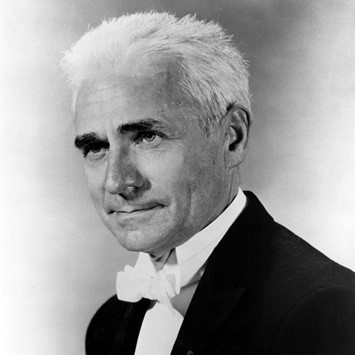Born January 10, 1910; Lyons, France
Died March 1, 1976; Paris, France
Jean Martinon studied violin at the conservatories in Lyons and Paris, composition with Albert Roussel and Vincent d’Indy and conducting with Charles Munch. He earned a master’s degree in arts from the Sorbonne in 1932. While serving in the French army during World War II, Martinon was taken prisoner in 1940, spending two years in a German prison camp. During his internment, he composed Stalag IX (Musique d’exil), Psalm 136 (Chant des captifs) and Absolve Domine.
Upon his release, Martinon made his debut as a conductor with the Pasdeloup Orchestra, leading his Second Symphony (Hymne à la vie). He soon became music director of the Bordeaux Symphony Orchestra, assistant conductor under Charles Munch with the Orchestre de la Société des Concerts du Conservatoire de Paris and associate conductor to Eduard van Beinum with the London Philharmonic Orchestra.
In March 1957, Martinon made his U.S. debut with the Boston Symphony Orchestra. He served as music director of the Israel Philharmonic and Düsseldorf Symphony Orchestra along with principal conductor of the Lamoureux Orchestra before making his debut with the Chicago Symphony Orchestra at the Ravinia Festival in July 1960.
Following an extended residency with the CSO in the spring of 1962, Martinon was named seventh music director to begin the following season. He introduced a variety of new works to the Orchestra’s repertoire, leading series of contemporary concerts at the University of Chicago and festivals of baroque music in Orchestra Hall. For RCA, Martinon and the Orchestra recorded works by Bartók, Bizet, Hindemith, Lalo, Martin, Massenet, Mendelssohn, Mennin, Nielsen, Ravel, Roussel, Varèse and Weber, including his Fourth Symphony (Altitudes).
Martinon later became chief conductor of the Orchestre National de Radio France and The Hague Philharmonic, and he also taught at the Paris Conservatory.


